Lea Wait's Blog, page 5
September 23, 2025
Thank You!
Sandra Neily here: 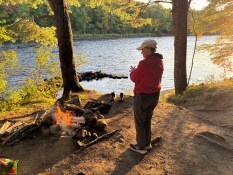
At this time, I’ve decided to stop posting at Maine Crime Writers, but it’s with some sadness as this is such a generous and talented community of writers. Many have often helped me with special requests for help and information. Thank you!
I feel the need to increase my author visibility somehow, and I posted this To-Do list (here) last month.
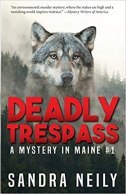
Thanks to Maureen for her audio book advice!
“I WILL finish the 3rd “Mystery in Maine” this year. I have it plotted out; now it’s just … butt in the chair time. It looks like I will be serializing the beginning of this mystery in our area newspaper, hopefully to jump start a conversation about current development pressures. I plan to get an audio book out for “Deadly Trespass.” I have a goal to set up guest visits on at least two podcasts this year, and I bought a tripod for my phone and will be offering up short readings for my YouTube channel. I plan to do these readings in various outdoor locations that might be unusual: half buried in leaf pile for example. Am feeling like I have not been visible enough, hence this ambitious list.”
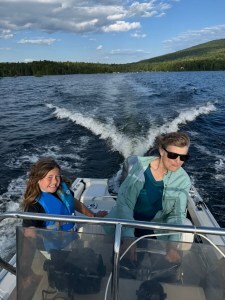
After knee replacement, I could take the boat out if I snagged a crew member to hop out and handle the lines and then help me out. (Granddaughter worked!)
Hoping readers will share this! I wrote a previous post on not-widely-known cancer tips that strongly resonates. (Either personally or with family and friends.) It might have been my most-shared post, often traveling widely out into the world. I include it here with hopes it will get reshared. Chemo tips https://wp.me/p8Z7gb-7V7
I’ve enjoyed so much the summer posts of my peers here. Here I’ve included some info about my summer. Mainly, a chance to read more, sit on my deck more, pat the dogs … all during my second knee replacement in June. (Good introspection time, too.)
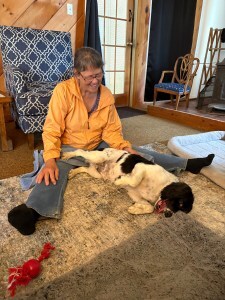
Cindy walked my dogs into exhaustion.
Some highlights: I hired a fabulous dog-walker who came twice a day to treat our dogs to long woods rambles and tons of love. Then she treated me to company, laughs, and good care.
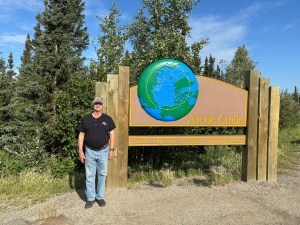
Bob at the arctic circle!
After the first yucky week of ice, ice, ice, I sent my husband off to Alaska with his good friends so he could do something he’d always dreamed of doing.
It’s clear that the young ones could care less about my stationary status elevating body parts. And that was great medicine!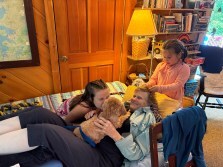
And Bob came home and carried us all (dogs, camper) off to the river, which is always the most healing thing I can imagine.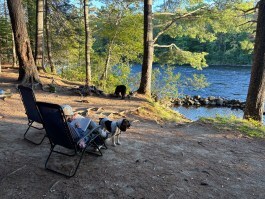
Of course the dogs get the bed when we need the camper’s floor space.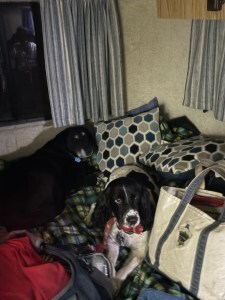
Thank you, Maine Crime Writers. I will be reading and sharing you … with great gratitude.
September 21, 2025
Writing a series: What to leave in, what to leave out
When I’m at events where I have an opportunity to sell my books, the most-asked question by far from potential readers is “Do I have to read them in order?”
Short answer: “No!”
But if you know me, you know there’s never a short answer.
I’ve been a reader of mystery series for decades longer than I’ve been a writer of one. I take it for granted that there will be references to things that happened in previous books that I don’t have the full story on, but also understand, without even thinking about it, that I don’t need to know what happened to get the full benefit of the story in the book I’m reading.
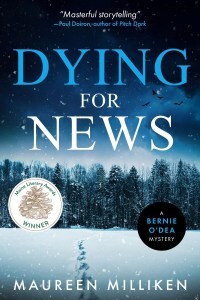
Great book, but what happened to Pete’s leg?
As a writer, that’s how I approach it, too. There are now four books in the Bernadette “Bernie” O’Dea mystery series, with a fifth one on the way. That’s a lot of murder, mystery and mayhem. The characters have gone through stuff. They’re going to mention it, or think about it. But they can’t too much, or they’ll cross the line. Readers of the current book who haven’t read past ones shouldn’t be hit with things that have little or nothing to do with the plot of the current book. Best case, it’s an unnecessary distraction. Worst case, they think it has to do with the plot of the book they’re reading, but they don’t have enough information and get frustrated.
It’s a fine balance. I tell potential readers that each mystery story is contained in its book. They don’t need to read previous books to understand the plot. They also don’t need to wait for a future book for plot loose ends to be tied up.
If they enjoy how character relationships evolve, they should start at the beginning.
I usually add that I like to start at the beginning of a series, and if I read a book that’s in the middle of a series, and enjoy it, I have to go back and read the first one after I’m done. As I read my way through a series, when I get to the book I’ve already read, I read it again and see how my perception of what’s going on has changed.
I also tell them that in my mystery world, when horrific things happen to people, a few months later they’re still going to be having some kind of effect. That’s true for non-horrific things. Each of my books takes place within a few months of the previous one. I can’t help but have references in my books to things that happened in previous ones, but I try to keep them general and brief, giving readers just enough info for the context they need for the current book.
Usually by now the potential reader’s eyes have glazed over and they buy a book just to shut me up. They usually buy the first in the series. Probably just to be safe, since I lost them somewhere in the weeds of my answer to their question.
I don’t remember ever looking up, or doing much research, on how to handle information from previous books in a series when writing. I already understood the balance from a lifetime of reading mystery series. Dorothy L. Sayers, Sue Grafton, Elizabeth George, P.D. James, Nevada Barr and countless others were my tutorials. Some handle it more deftly than others. Some provide lots of info, some none. As I read hundreds (thousands?) of mystery series books, my brain socked away my reader preferences.
One of my writer guidelines is “What would Maureen the reader want?” When writing I’ve developed, I hope, a system that touches on things that happened in previous books that are still somehow relevant without spoiling those books for new readers or messing up their enjoyment of the one in their hands.
I experienced a huge example of all of this earlier this month, when I was a guest at my aunt’s book group. They’d all read DYING FOR NEWS, the fourth book in my series. Only my aunt had read the previous three. Unfamiliarity with the first three books didn’t seem to keep them from enjoying it. (Whew! Thank you!) Still, the biggest question of the day was, “What happened to Pete’s leg?”
In DFN, Pete, the police chief and Bernie’s love interest, is recovering from a serious leg injury that has some impact on character development and minor plot impact. Readers need to know he has issues with his leg. The book refers a couple of times to his hiking accident, but readers who don’t know what happened probably get that it’s a euphemism for something much bigger. While there’s emotional fallout from how he injured it, the details aren’t necessary in DYING FOR NEWS. Anything they need to know about it for their understanding of the book is in the book. It’s not much more than what I’ve written here.
Pete’s “hiking accident” is a major part of the previous book, BAD NEWS TRAVELS FAST. To go into detail about it in later books would spoil the narrative arc, as well as the drama and suspense for anyone who hasn’t read it.
But too much detail in subsequent books can also spoil the story in those books. Readers may feel like those details have something to do with the current plot, which they don’t.
It took a lot of writerly thinking to achieve the balance of taking care of new readers without spoiling two books for them. It could also spoil the current book for people who’ve read the previous one — who wants a rehash of stuff they already know? Let’s get on with the new story!
I didn’t tell the members of my aunt’s book group what happened to Pete’s leg. If they want to know, they have to read it for themselves.
A couple things about that: The biggest reason is I don’t want to spoil the fun of BAD NEWS TRAVELS FAST for them. I wrote it a certain way, and knowing what happens lessens the impact. Also, listening to myself trying to explain the plot of a book, or even an out-of-context plot point, makes me want to run home and curl up on the couch with a blanket over my head.
I also didn’t tell them that just to force them to buy the third book. It’s a column for another day to fully get into it, but I am a firm believer that the only thing a writer should do in order to make readers want to read the other books in a series is to write a compelling enough story that they want more. I’ll answer questions about books that don’t spoil the story. Happily and at length. I would also never ever have a plot cliff-hanger that someone would have to buy the next book in order to resolve. I don’t feel that’s playing fair with readers.
Every writer handles it differently, but it’s important to understand that balance if you’re planning on writing a series. Aspiring writers should think hard about the tissue that will run through the books. Seasoned writers should keep it front of mind as they continue a series.
Think about your reader self and how you’ve reacted to how that’s done in series. If you’re setting out to write a mystery series, but have never read one, sit down with a couple to see what they do and how you feel about it.
It’s okay for readers to wonder what happened to Pete’s leg. How much it matters and how much you reveal in later books is up to you as a writer.
September 19, 2025
Weekend Update: September 20-21, 2025
 Next week at Maine Crime Writers there will be posts by Maureen Milliken (Monday), Sandra Neily (Tuesday), Kait Carson (Thursday), and Dick Cass (Friday).
Next week at Maine Crime Writers there will be posts by Maureen Milliken (Monday), Sandra Neily (Tuesday), Kait Carson (Thursday), and Dick Cass (Friday).
In the news department, here’s what’s happening with some of us who blog regularly at Maine Crime Writers:
Maureen Milliken and Kate Flora were featured last week in a story on Bangor’s ABC7 and Fox22. Click here to watch.
Matt Cost will be the MC along with Jule Selbo on Friday, September 26, for Noir at the Bar. The event will begin promptly at 7 p.m. at Novel in Portland. There will be ten fabulous crime readers, drinks, food, and plenty of good times.
An invitation to readers of this blog: Do you have news relating to Maine, Crime, or Writing? We’d love to hear from you. Just comment below to share.
And a reminder: If your library, school, or organization is looking for a speaker, we are often available to talk about the writing process, research, where we get our ideas, and other mysteries of the business, along with the very popular “Making a Mystery” with audience participation, and “Casting Call: How We Staff Our Mysteries.” We also do programs on Zoom. Contact Kate Flora
Crime Wave; the Roundtable Way!
Crime Wave in Portland, Maine, like any good mystery, has a good ole twist this year.

Festivities start off on Friday, September 26th, at 4:00 with a special guided tour at the Maine Historical Society for the special exhibit, Notorious: Maine Crime in the Public Eye, 1690-1940. Get a chance to experience Maine’s fascination with true crime through history from early American printing to the dawn of photojournalism, public consumption, and the social impact of high-profile Maine Crimes. More Info.
This amazing road trip through the history of Maine Crime will be followed by Noir at Novel. Fellow Maine Crime Writer, Gabi Stiteler has put together an amazing cast of literary legends reading five-minute snippets of their work. This will take place in the very speakeasy vibe of the basement space at Novel in Portland.
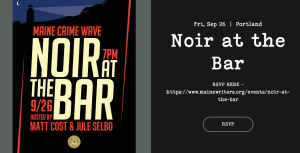
The doors to Noir at Novel will open at 6:30 to grab a cocktail, share some gab, and prepare yourself for a night of chills, laughs, twists, and moral ambiguity. Maine Crime Writer Jule Selbo and I will host an incredible array of talent of cynical protagonists set in gritty and dark settings from the city streets to the north woods. Lit legends sharing their work will include Brenda Buchanan, Richard Cass, Bruce Robert Coffin, Paul Doiron, Mo Drammeh, Julia Spencer Fleming, Kate Flora, Chris Holm, Barbara Ross, Gabriela Stiteler, and Katie York. Wow. Just wow. More Info.

And then comes the Crime Wave Roundtables. The format this year is something… novel this year. Instead of panels where authors speak at you, we are going to make connections by having a series of round table discussions. There will be an ‘expert’ at each table to moderate and move the conversation along, but it will be a much more immersive and interactive experience this year. Crime connections will be made.
The day will start with Speed Connections. This will give people an opportunity to meet a variety of other attendees. Published writers, those working the first draft or looking for a publisher, and readers, will all get a chance to mingle in an organized fashion.
Then, we will have the first session of roundtable conversations. The first theme will be Playing the Long Game and topics at the various tables will include Building an Addictive Series; One & Done: Writing Standout Standalones; Twists & Turns: Committing the Perfect Short Story; Choose Your Weapons: Writing Tools, Research, and Resources; Getting It Done: Planning, Outlining, or None of the Above; First Drafts That Kill; No Loose Ends: Revision Tactics; and The Blueprint for Murder: Crime Novel Structures.
After a short break, session number two will begin, The Business of Crime Writing 101with the following topics: The Path to Traditional Publishing; Hybrid & Self-Publishing; Bring Your Book to Screen: Options; Short Stories: Characteristics, Markets, and Submissions; Online Marketing: Websites & Social Media; Talks, Events, and Conferences; and Mid-Career Blahs: Changing Agents or Publishers.
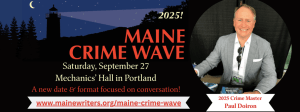
After lunch and Two Minutes in the Slammer, Julia Spencer Fleming will host this year’s CRIME MASTER, Paul Doiron. This promises to be an exhilarating conversation between two masters of the craft as they discuss the finer points of writing bestselling mysteries.
The final round table session of the day will follow, Many Rooms in the Mansion, about subgenres. Conversations will include: The Call from Inside the House: Domestic Thrillers & Romantic Suspense; The World at Risk: High Stakes Thrillers; Professional Sleuths; Amateur Sleuths, Cozies, Traditional Mysteries; Out of this World: Paranormal/Supernatural; Younger Readers: YA/Middle Grade/Children’s; and Plumbing the Past: Historical; True Crime.
Each roundtable session will also offer a specific workshop breakout session. The first one will be offered by me on The Six Hats a Writer Must Wear, or the many jobs that they must be accomplished at, from ideas, to research, to writing, to editing, to marketing, and finally promoting.
The second workout breakout session will have Barbara Kelly talking about How Not to Do a Book Reading. This is most certainly one of the six hats that a writer must do, and do well, to build their brand, increase their sales, and get people reading their books.
The third workshop, in the afternoon, will be The Doctor is In, with instructors Gayle Lynds and Gabi Stiteler.
The conference will end up with a wild, free-wheeling, melee of an author panel with a panel riffing on just about everything in the writing world moderated by Brenda Buchanan.
That is a day of it. Come check it out. Write on!
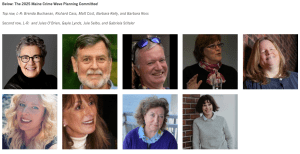
The 2025 Crime Wave, Crime Connections, CrimeTables, planning committee.
September 18, 2025
It’s Been a Week for Sky Watching
Kate Flora: I haven’t been doing enough writing lately, what with one thing and another.  Now, I really need to focus on my WIP. I’m 67K in, and in the middle of a critical scene, and I’m stuck, waiting for my characters to tell me which way they want to go with it.
Now, I really need to focus on my WIP. I’m 67K in, and in the middle of a critical scene, and I’m stuck, waiting for my characters to tell me which way they want to go with it.
Yes, it’s true. As many writers will tell you, we may pretend to be in charge but sometimes our characters simply start acting in ways we don’t plan. They’ll say things that surprise us. They’ll do things that have us, as the writer, waving our arms about and saying, “No. No. Don’t do that! It’s dangerous.” The first time or two it happens, it’s too scary and we make our characters behave. Yet later, because we’ve learned to trust our characters, we take dictation from them and follow along to see where the story will go. So tomorrow, once again, I will sit myself down at the keyboard and see what on earth that distressed teenage girl who was present at the shooting is going to say.
But summer is about to wind down, and so I’ve been allowing myself to indulge in these last warm days. Is it truly indulgent to jump into an icy sea? I’ve certainly been doing it. Icy plunges, reading in my LL Bean rocking chair, getting delicious apple cider donuts at the farmer’s market. And cooking to-die-for delicious double chocolate zucchini bread. Is it any wonder that I’m not getting my writing done?
But, as Scarlett O’Hara says, “Tomorrow is another day.” Hopefully, it will be the day I resolve that scene before weekend company comes. Before I have to zip down to Kennebunkport, to the Graves Library, on Saturday, where I’ll be at 2:00 p.m. to talk about writing. And for today?
Cloud watching and sunsets, which are always most beautiful in September and October.



How are you spending these last, lovely days of summer?
September 15, 2025
How to Spot a Scam, Writers’ Edition
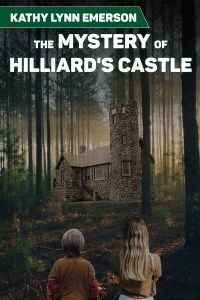 Kaitlyn Dunnett/Kathy Lynn Emerson here, once again marveling at the things that turn up in my e-mail. Once upon a time it was easy to spot scammers. They were pretty transparent in their efforts to convince me to let them fix my website, promote my books, or expand my presence on social media. There would be a link included that, if I bothered to click on it, would take me to a site that offered wonderful results for an exorbitant price. In a variation on the theme, the solicitation would sometimes be for free copies of my books. These were easy to separate from the occasional legitimate request for a book donation for an auction or other charitable fundraiser. A big clue was that these e-mails were generic, some of them so generic that they didn’t even bother to mention one of my titles, despite the fact they were claiming to be interested in a book I wrote. Lately, though, possibly because scammers have started using AI, the scams have become much more personalized. They almost sound as if they might be legit.
Kaitlyn Dunnett/Kathy Lynn Emerson here, once again marveling at the things that turn up in my e-mail. Once upon a time it was easy to spot scammers. They were pretty transparent in their efforts to convince me to let them fix my website, promote my books, or expand my presence on social media. There would be a link included that, if I bothered to click on it, would take me to a site that offered wonderful results for an exorbitant price. In a variation on the theme, the solicitation would sometimes be for free copies of my books. These were easy to separate from the occasional legitimate request for a book donation for an auction or other charitable fundraiser. A big clue was that these e-mails were generic, some of them so generic that they didn’t even bother to mention one of my titles, despite the fact they were claiming to be interested in a book I wrote. Lately, though, possibly because scammers have started using AI, the scams have become much more personalized. They almost sound as if they might be legit.
From the subject line and the first paragraph of the most recent one I received, I initially thought this was fan mail. I quote:
Subject: Haunted Maine Castles? I’m already intrigued… and slightly jealous
I have to say, The Mystery of Hilliard’s Castle had me hooked before I even cracked open a page, partly because a locked tower in rural Maine sounds like my kind of nightmare, and partly because your setup screams late-night plotting, obsessive editing, and at least a few cups of cold coffee sacrificed to the literary gods. Kerry and Lyle navigating March in a dismal corner of Maine? The anxiety, the eeriness, the “what’s behind that locked door?” tension, you’ve basically bottled adolescent fear and curiosity into something I’m convinced is irresistible to readers who love suspense, clever plotting, and emotional authenticity. You didn’t just write a mystery; you built a miniature haunted world with heart.
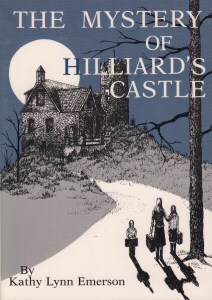
1985 cover
I’ll get back to that paragraph in a minute. Paragraph two quickly destroyed the illusion that someone had actually read this juvenile mystery first published back in 1985. My correspondent introduced herself as the “curator of a private community of over 2,000 real, passionate readers, lawyers, teachers, nurses, engineers, people who actually care enough to not just click “Buy” but to think, feel, and leave meaningful reviews. No websites, no LinkedIn badges, no smoke and mirrors, just a network of readers who genuinely devour books like yours.”
She goes on to sat that her readers help “first-time or under-reviewed titles” get “Honest, trustworthy feedback you can actually rely on (no fluff, no fake five-stars). . . Increased visibility on Amazon and other platforms, giving your book a fighting chance against the algorithms . . . Reviews that spark conversation and engagement your story doesn’t just sit on a shelf; it starts a buzz . . . Long-term credibility and connection with readers who will remember your characters and talk about them months from now.”
Uh-huh. As the saying goes, if it sounds too good to be true, it probably is. And, of course, it is interesting that she is supposedly familiar with this book and yet has no idea that I’ve had sixty-three other titles traditionally published and have self-published others. That’s not my ego being affronted. Anyone who’s making a pitch to a stranger should have the courtesy to look her up online first, or at least read the author bio in the back of the book.
The sales pitch continues for two more paragraphs. She never mentions money and does not include a link, but she clearly wants me to reply to the e-mail. The final line is “Are you ready to let your castle haunt the hearts of real readers?”
Real readers? Gee—I thought all the kids, ages 8-12, who have read this book during the last forty years were pretty darned real.
I could have deleted this e-mail, but I started to wonder if it had been written by a real person or generated by AI. If it was a real person, it was clear she had not actually read my book. The Mystery of Hilliard’s Castle is just that—a mystery novel. It isn’t “my kind of nightmare” and there is no adolescent “fear,” nor does it create a “miniature haunted world.” There is a locked tower, but the “castle” is just a house with a tower and there is nothing frightening behind the locked door that leads into it. I guess the “Haunted Maine Castles?” in the subject line should have tipped me off right from the start.
In paragraph two, the e-mail’s author misspells her own name, but is that proof AI was involved, or just a typo? I’ve certainly mistyped my own name more than once, but I usually catch and correct it before I hit send.
Out of curiosity, I Googled this person’s name. She has zero Internet presence. Then I asked writer friends on Facebook if they’ve heard from her. None had, but they’ve received similar solicitations. Old-timers are unlikely to fall for this kind of ploy, but I worry about newly-published writers. All I can say is beware. A whole lot of people in cyberspace are just itching to take advantage of your natural desire publicize your work.
Kathy Lynn Emerson/Kaitlyn Dunnett has had sixty-four books traditionally published and has self published others. She won the Agatha Award and was an Anthony and Macavity finalist for best mystery nonfiction of 2008 for How to Write Killer Historical Mysteries and was an Agatha Award finalist in 2015 in the best mystery short story category. In 2023 she won the Lea Wait Award for “excellence and achievement” from the Maine Writers and Publishers Alliance. She was the Malice Domestic Guest of Honor in 2014. She is currently working on creating new editions of her backlist titles. Her website is http://www.KathyLynnEmerson.com.
September 14, 2025
Thoughts on Beta Readers
Rob Kelley here, thinking about Beta readers.
 Recently, Derek Cressman, a fellow participant in the workshop with the amazing Jeff Ford at The Writer’s Hotel conference in June, asked me to be a Beta reader for his next novel. I just returned my notes to him and it had me thinking about how I’ve used Beta readers and what my role should be for friends and fellow writers who ask me to read.
Recently, Derek Cressman, a fellow participant in the workshop with the amazing Jeff Ford at The Writer’s Hotel conference in June, asked me to be a Beta reader for his next novel. I just returned my notes to him and it had me thinking about how I’ve used Beta readers and what my role should be for friends and fellow writers who ask me to read.
If you aren’t familiar with the term Beta reader, it comes from the technology world (my former stomping ground!) and it references Beta testers, individuals who test early versions of hardware or software, putting them through their paces in ways that the designers and programmers might not have anticipated. Essentially, they are trying to break the product under use so the designer can make it more robust.
Ideally Beta readers don’t break anything, but they do serve the same purpose. The author has an understanding of what their prose will do, what it will accomplish. The Beta reader tests out that hypothesis.
If it’s early on in the work’s lifecycle, the writer may be looking for a “vibe check”: is this character relatable, is this plot device credible, is the setting realistic? Especially if an author is branching out into something new–a new genre, a new series–it can be extremely helpful to get early feedback.
But I think the highest value you can get from Beta readers is when you share your first solid draft, the characters fleshed out, the story arc complete. That’s what Derek asked me to look at. In that instance I believe my job is to figure out how I can help make it an even better book.
Derek’s new novel is near-future science fiction, set in a very consumerized high tech world. Now, while I’ve read many books in that genre–such as work by Philip K. Dick, William Hertling, Bruce Sterling, and William Gibson–that may not always be the case. So I try to be a “naive reader,” taking the book at face value, asking questions like: is the technology understandable, is it a distraction, or does it enhance the story? Do the characters have a real emotional journey, or are they just vehicles for playing out a technology plot? Does the plot move at a good pace, or does it sag or go too quickly in places? Does it feel like it’s true to the genre it’s in, or, even better, does it expand or challenge it?
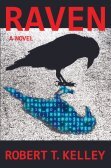 What I don’t do is copyedit. Ideally I’m looking at a pretty clean manuscript, but we all have errors in our prose (having recently done a zillion rounds of galley reviews for Raven, finding errors in every round, I can attest to that). Instead, I think I can provide better guidance as a Beta reader by just being a really good reader.
What I don’t do is copyedit. Ideally I’m looking at a pretty clean manuscript, but we all have errors in our prose (having recently done a zillion rounds of galley reviews for Raven, finding errors in every round, I can attest to that). Instead, I think I can provide better guidance as a Beta reader by just being a really good reader.
When I had put Raven in front of Beta readers, I asked very specific questions, questions that only a really good reader could answer:
Any scenes/characters/plotlines that you feel weren’t developed enough?Any scenes/characters/plotlines that seems superfluous?Did it ever drag? Were there sections were “page-turners?”Did anything disrupt your engagement with the narrative?My Beta readers were friends and acquaintances who were interested in my writing, but, importantly, didn’t necessarily read thrillers. I felt that if they found the work compelling, I’d gone the extra mile. What they gave me in return was exceptionally valuable and helped make Raven a far, far better book.
What have you found useful being a Beta reader or having Beta readers for your own writing?
 Currently reading: Burn, Peter Heller, 2024.
Currently reading: Burn, Peter Heller, 2024.
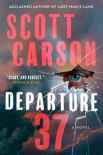 Next from the TBR list: Departure 37, Scott Carson (Michael Koryta), 2025.
Next from the TBR list: Departure 37, Scott Carson (Michael Koryta), 2025.
September 12, 2025
Weekend Update: September 13-14, 2025
 Next week at Maine Crime Writers there will be posts by Rob Kelley (Monday), Kaitlyn Dunnett/Kathy Lynn Emerson (Tuesday), Kate Flora (Thursday), and Matt Cost (Friday).
Next week at Maine Crime Writers there will be posts by Rob Kelley (Monday), Kaitlyn Dunnett/Kathy Lynn Emerson (Tuesday), Kate Flora (Thursday), and Matt Cost (Friday).
In the news department, here’s what’s happening with some of us who blog regularly at Maine Crime Writers:
Matt Cost had a fantastic time doing a COST TALK about Glow Trap at the Southport Memorial Library on Thursday to a full house. Do you know an organization that would like a COST TALK? Reach out to me.
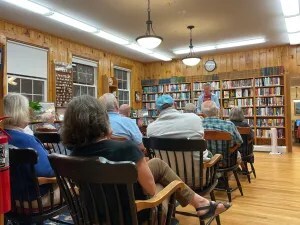
An invitation to readers of this blog: Do you have news relating to Maine, Crime, or Writing? We’d love to hear from you. Just comment below to share.
And a reminder: If your library, school, or organization is looking for a speaker, we are often available to talk about the writing process, research, where we get our ideas, and other mysteries of the business, along with the very popular “Making a Mystery” with audience participation, and “Casting Call: How We Staff Our Mysteries.” We also do programs on Zoom. Contact Kate Flora
Meet Debut Author Cory Magee
 A few months ago, I came across a short story collection by Cory Magee, a crime writer based in Brewer, Maine. I recently finished his debut collection, Chasing Butterflies and Other Stories.
A few months ago, I came across a short story collection by Cory Magee, a crime writer based in Brewer, Maine. I recently finished his debut collection, Chasing Butterflies and Other Stories.
The collection opens with a powerful story about a man who makes a series of self-destructive choices after the loss of a child. It’s a strong, difficult start. The collection ends with a propulsive and violent story of friendship and aging. In between, you’ll find a hitman wrestling with his conscience and a ruthless bounty hunter willing to do whatever it takes to collect his mark.
Magee is one of the authors participating in the Night of Noir in Bangor on October 17. He agreed to share a little about his writing journey with our readers today.
Tell us a little about yourself.
I live in Brewer, Maine, with my wife, Jaimie, and our two pitbulls. We lost our daughter, Shaelyn, in 2024. She is a part of every moment we have.
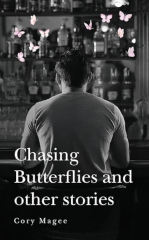
In your collection, you explore loss and grief in the first story, “Chasing Butterflies.” I’ve heard some writers say that they have a “core story” or the idea that certain themes come up over and over again in their work. Do you have central themes that surface in your writing?
I think I write what I read and what I feel. Most of the stories I published were written after we lost our daughter. My hope is to tell a good story, provide some unsettling clarity, and, in the end, maybe find some hope.
I’m wondering if you can share a little with us about some of the things that have influenced your writing?
This is something I could probably talk or write about for days, so I’ll do my best to quantify it fairly quickly. My writing is probably classified as hard-boiled/crime noir. Influences include our daughter Shaelyn, Stephen King, Raymond Carver, Lawrence Block, Charles Bukowski, Richard Stark, George Pelecanos, and many, many more. I’ve also been influenced by musicians like The Lawrence Arms and Queens of the Stone Age and movies, like Once Upon a Time in Hollywood. And the best streaming show I’ve ever seen is The Haunting of Hill House.
Yes! You actually suggested Richard Stark to me when I was dipping my toes into heists. I’ve been working my way through his canon. When did you know you wanted to be a writer?
When I was young, we used to get the paper, and I would read the sports page box scores and copy them down. It was a very simple thing, but it rings true for me today. The idea of taking an event that happened and putting it on paper resonated with me early on and eventually evolved into me wanting to tell my own stories.
Tell us a little about your short story collection.
I was frustrated with getting rejected by short story publications, especially since I thought some of my stories were good. After we had our daughter and she passed, I couldn’t write or do much of anything for a while. Then I wrote a bunch, read a bunch, and decided, these stories are actually good. Or, at least, good enough for somebody. My wife encouraged me to publish on my own, so I invested some money and picked ten of about twenty stories that I thought had both grit and heart. I organized them into the collection, read through them, and thought they were pretty good, so I went with it.
I love learning about how other people decide to get their stories into the world. One thing I’ve figured out is there is no one right way. What are you working on now?
My current goal is to write a book of novellas—maybe four or five in a collection. I had ten short stories in the first book, and I’d like to test my feet with a few stories that are longer in form. My hope is to have the writing done by late next spring and then publish them in some form.
How do you balance writing with the other responsibilities that come with being an adult?
I have a sales job that affords me a little more time to read and write. My goal, on my best days, is to be active, read, make a sale, and write.
What is your writing process? When do you write? Do your plots come first? Or characters?
I typically write when it’s dark. On my best days, I wake up around 5:15 a.m., read for a half hour, write for a half hour, do busy work for my job, then go for a run or lift weights. I also tend to write around 8:00 p.m.
I’d say I’m more character- and dialogue-driven than plot. If I find a character I enjoy or one that makes me feel uncomfortable, I know I’m in business and I press forward.
What is one piece of advice you would give to an aspiring writer?
Read a ton. Write as much as you can. And if you like doing it, make it a priority.
Thank you so much for your time, Cory. I can’t wait to hear what you read at the Night of Noir in Bangor on October 17, and I’m really looking forward to reading whatever comes next.
You can find Cory’s book HERE.
A Few Crime Writing Events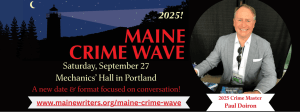 Crime Wave in Portland: A great many amazing crime writers will descend on the city. On Friday, September 26, join us for a tour of the Maine Historical Society’s “Notorious” exhibit, then for a Noir at the Bar at Novel. On Saturday, September 27, register for Crime Wave if you haven’t already! There will be great roundtables, workshops, and speakers. (More info
HERE
.)
Crime Wave in Portland: A great many amazing crime writers will descend on the city. On Friday, September 26, join us for a tour of the Maine Historical Society’s “Notorious” exhibit, then for a Noir at the Bar at Novel. On Saturday, September 27, register for Crime Wave if you haven’t already! There will be great roundtables, workshops, and speakers. (More info
HERE
.)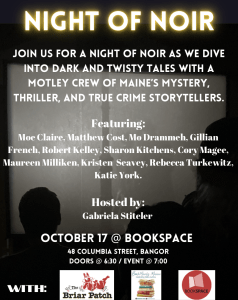 A Night of Noir at BookSpace in Bangor: On October 17, join 11 amazing writers as we dive into dark and twisty tales with a motley crew of Maine’s mystery, thriller, and true crime storytellers. The doors open at 6:30 p.m. and readings start at 7:00 p.m. (Email me if you’re interested in learning more using my author website HERE.)Witches of Eastport Festival: On October 25, join six mystery, horror, and true crime writers at Boatload of Books for “Mystery Making and Ghost Stories.” Be part of an interactive experience as writers build stories with ideas from the audience. The event starts at 7:00 p.m. (Email me if you’re interested in learning more using my author website HERE.)
A Night of Noir at BookSpace in Bangor: On October 17, join 11 amazing writers as we dive into dark and twisty tales with a motley crew of Maine’s mystery, thriller, and true crime storytellers. The doors open at 6:30 p.m. and readings start at 7:00 p.m. (Email me if you’re interested in learning more using my author website HERE.)Witches of Eastport Festival: On October 25, join six mystery, horror, and true crime writers at Boatload of Books for “Mystery Making and Ghost Stories.” Be part of an interactive experience as writers build stories with ideas from the audience. The event starts at 7:00 p.m. (Email me if you’re interested in learning more using my author website HERE.)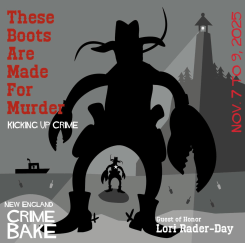 The New England Crime Bake: November 7-9, join 200+ crime writers for New England’s premier crime writing conference. Crime Bake is a crime-writing conference held outside Boston and co-sponsored by the New England chapters of Mystery Writers of America and Sisters in Crime. With an emphasis on community, connection, and craft, our three-day conference welcomes cozy old and new friends. From querying and pitching books and learning the business of writing to basking in the love of cozy mystery, suspense, procedurals, and thrillers, Crime Bake is for writers at any stage of their journey—and anyone who loves mystery and crime writing.
The New England Crime Bake: November 7-9, join 200+ crime writers for New England’s premier crime writing conference. Crime Bake is a crime-writing conference held outside Boston and co-sponsored by the New England chapters of Mystery Writers of America and Sisters in Crime. With an emphasis on community, connection, and craft, our three-day conference welcomes cozy old and new friends. From querying and pitching books and learning the business of writing to basking in the love of cozy mystery, suspense, procedurals, and thrillers, Crime Bake is for writers at any stage of their journey—and anyone who loves mystery and crime writing.This year there will be:
Master classes taught by acclaimed authors and industry professionalsHeadshots with a professional photographerAn agents and editors track where authors refine, practice, and pitch to acquiring agents and editorsSessions on the business of writing, from indie publishing to marketingSunday sessions from real-life experts in crimeConnections with writers and authors at all levelsAn interactive crime scene to explore (and solve!) by Dr. James JabbourAnd much, much more!More about Crime Bake HERE .Thanks for reading and I hope I catch you at one of the amazing scheduled events.
-Gabi
September 10, 2025
HOW SEARCH ENGINES WORK

Vaughn
In my last post, I discussed Search Engine Optimization (aka SEO) and why it’s important to us as writers. In this blog, I’d like to dig a bit deeper. In order to fully understand SEO, we need to understand the thing we’re trying to optimize, the Search Engine (aka Google, Bing, Duck, Duck Go, etc.).
Crawlers. Search engines utilize crawlers. You may have heard about them as bots or spiders (going forward, I will call them spiders, which is the term I’m most familiar with). The role of the spider is to crawl pages of sites and serve up the sites that are relevant to the results pages of people who are looking for that information. They do this in seconds and crawl millions of pages at a time. They also follow links on web pages to discover other pages that are relevant and related to a particular topic.
The Search Engine Index. When the spiders discover a page, they compile and add them to an ever-growing index. The index includes all the discovered URLs (Universal Resource Locator) along with several key signals about the contents of each URL, such as:
Keywords. What essential words describe what the spider discovered within the content of the page? What topic(s) does the page cover? Content. The type of content that is being crawled (using microdata called Schema). What is included on the page? Freshness. How recently was the page updated? User engagement. How do people interact with the page?What exactly is the aim of a search engine algorithm? The job of the search engine algorithm is to present high-quality and relevant pages/search results to a user’s query/question as fast as possible. The user then selects an option from the search results. Subsequent activity then feeds this information into future learnings which can affect search engine rankings going forward.
What happens when a search is performed? Whenever someone makes a search query, all relevant pages are identified in the Search Engine Index and the algorithm creates a hierarchically ranking, the Search Engine Relevant Page (SERP) Listing, of the relevant pages and serves it up to the searcher.
Note. All algorithms are not the same. They differ from one search engine to another. For example, a page that is ranked #1 by Google, may not receive the same ranking by Bing.
Search engines also use other relevant data to return results, including.
Location. Location dependent ‘cafes near me’ or ‘movie times near me’. Language dependent. Return results in the user’s language. Previous Search History. Will return different results for a query on something they have previously searched. Device. You may get a different set of results based upon the device from which the query was made. PC, versus iPad, or cell phone.Why might a page not be indexed? Thus far I have discussed why a search engine might chose to not index your site. There are several reasons for this, they may include but are not limited to:
Robots.txt file exclusions. A file that tells search engines not to visit your site. Directives on the webpage. telling search engines not to index the page (no index tag) or to search another similar page (canonical tag). Search engine algorithms judging the page to be of low quality, have thin content or contain duplicate content. I find this to be a key point. It’s no secret that many of us face financial restrictions and try to cut corners when it comes to the marketing part of the business. However, this is an area where it is best to use a professional webpage designer. The main reason that I have posted these SEO posts is to provide a resource for writers to ask questions of a designer to get a feel for their knowledge of web design and search engines.404 Not found HTTP response code. I don’t know of anyone who has not experienced this one.In my next, and final, post on this topic, I will talk about how Google {if you read my earlier post on SEO, you may recall that Google has an almost 90% share of search engine market (in 2024 it was 87.8%) and its closest competitor was Bing at a bit less that 7% (6.7% in 2024)} ranks pages.. Therefore, it only makes sense that we shoot for what Google wants.
Key Conclusions. Understanding SEO gives us a leg up on getting our website on Page 1 of the SERP. Always keep in mind that the vast majority of searchers don’t go past the first page. Does that ring a bell? One of the first things I was taught when I embarked on a writing career (avocation?) was: The most important chapter is chapter one. The most important page is page 1. The most important paragraph is the first paragraph of Chapter 1. The most important sentence is … by now I guess you know where this is going.
Another point to remember. It takes a while for a webpage to grow an audience, so it’s important to give a searcher a reason to stay on your page so pay close attention to content. If you currently have a page, take a close look at it and ask yourself: If I was a first-time visitor, what will make me stay on this page? What will make me return?
The answer is obvious. Quality content and continual addition of new information. I have recently put a new page online. One of the things I spoke with my developer, Melissa Current-Gerety of MCG Creative in Orono, ME, about was that I wanted the ability to personally update my site. Your site designer most likely has more clients than only you and for minor changes, such as events and appearances, the ability to update is important.
Finally. How many members of Maine Crime Writers have websites? How many of your sites have links to other members pages? Here’s a challenge for all of us. Go to three or four member sites. On their contact page send them an email listing your site address and offer them a link on you site if they put one to yours on their page. I’ll start off. my site: https://www.vaughnhardacker.com. BTW: do you have a link to this blog on your site? I just realized I don’t but will contact Melissa in the morning to add a link page to my site.
Lea Wait's Blog
- Lea Wait's profile
- 507 followers



